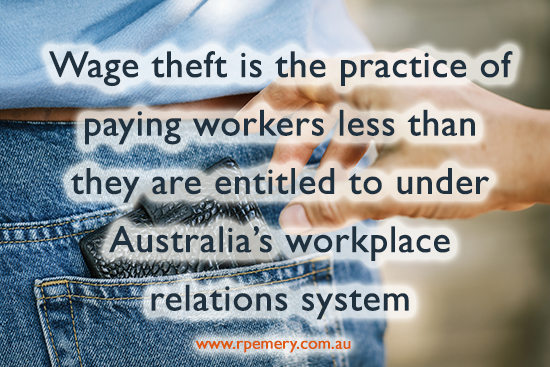Employees have the right to be paid the correct pay rate for all time worked. Depending on the type of work you do, your minimum pay rate may be outlined in legislation, your contract of employment or the relevant award or workplace agreement under which you are employed. If you are receiving less than your applicable minimum wage, you may be a victim of wage theft.

What is wage theft?
The employment relationship is built upon an imbalance of power. More often than not, an employer will retain the authority to determine their workers’ wages and other conditions of employment. In light of this imbalance, it is not surprising that some employers regularly take advantage of workers to obtain financial gain.
Wage theft is the practice of paying workers less than they are entitled to under Australia’s workplace relations system [1]. Most commonly, wage theft will involve an employer deliberately underpaying less than the minimum hourly rate. However, it can also take on a variety of other forms. These include, but are not limited to –
- Unpaid superannuation;
- Failing to pay an employee’s entitlement to penalty rates, overtime and allowances;
- Failing to pay for trial or training periods;
- Taking inappropriate deductions from wages for things such as cash shortages, accommodation and transport costs;
- Refusing to pay personal, annual or other forms of compensated leave
Wage Theft Law in Australia
In Australia, it is illegal for an employer to withhold an employee’s statutory entitlements. Under the Fair Work Act, an employer is prohibited from contravening the national minimum wage order, the National Employment Standards (NES), a modern award or an enterprise agreement. If an employer breaches their obligations under the Act, a court may impose a civil penalty such as a monetary fine or order the employer to repay their victim’s wages.
Some states aim to crack down further on Australia’s wage theft epidemic by introducing specific criminal offences. In June 2020, Victoria became the first state in Australia to pass laws that establish criminal penalties for employers who deliberately underpay their workers or withhold other employment entitlements [2].
Under the Wage Theft Act 2020 (Vic), it is a criminal offence for an employer in Victoria to –
- deliberately underpay employees
- dishonestly withhold wages, superannuation or other employee entitlements
- falsify employee entitlement records to gain a financial advantage
- avoid keeping employee entitlement records to gain a financial advantage [3]
Most notably, the definition of wage theft under the Act does not extend to any honest mistakes which are made by employers who exercise due diligence in paying wages and entitlements [4].

This new law takes effect from 1 July 2021 and imposes severe penalties upon offenders to hold employers accountable for their actions and deter the exploitation of workers. Individual employers found guilty of a wage theft offence face fines of up to $198,264 or a maximum sentence of 10-years imprisonment. Companies or body corporates also face a staggering fine of up to $991,320.
Queensland has since followed in Victoria’s footsteps and amended its Criminal Code to prosecute wage theft as stealing. New South Wales has also committed to play its part in tackling wage theft by introducing a bill to target dishonest business owners who evade payroll tax by underpaying workers.
Recent Examples of wage theft in the media
Wage theft occurs across many different industries and occupations but is particularly rampant in hospitality. In a recent survey conducted by the Hospo Voice union, 82% of workers reported some form of wage theft in their current or previous hospitality job. Hospitality workers are often employed on a casual basis. Due to the precarious nature of their employment, these workers may avoid speaking up about wage theft in fears that their employer may cut back their hours or stop giving them shifts altogether.
You may be familiar with some celebrity restaurant wage theft scandals reported in the media. Former MasterChef judge George Calombaris was recently busted for underpaying $7.83 million in wages to more than 500 employees across his stable of popular restaurants. In addition to an order to pay back the wages, Calombaris has since been slapped with a $200,000 fine and signed an undertaking to ensure improved wages and record-keeping [5].
In 2018, former high-end Melbourne restaurant ‘Dinner by Heston’ also came under fire for wage underpayment. The Fair Work Inspector responsible for looking into the allegations formed a reasonable belief that the restaurant sponsored by British culinary royalty Heston Blumenthal potentially owed its employees millions of dollars in wages and other entitlements [6]. However, rather than complying with a notice to resolve the outstanding underpayment issues, the company has since entered into voluntary liquidation.
These examples should serve as a warning to all employers that the exploitation of workers will have significant and lasting consequences for the ongoing viability of their business.
What to do if you’re a victim or suspected victim of wage theft
If you suspect you are a victim of wage theft, it is important to be aware of your options.
You may wish to raise any concerns with your employer directly to resolve any outstanding issues before deciding to pursue a formal course of action. However, if this is not possible, you should contact your relevant union for further information or assistance.
If you are a Victorian resident, you can report suspected wage theft anonymously to Wage Inspectorate Victoria by completing an online forming or calling 1800 287 287. Under Victoria’s new wage theft laws, Wage Inspectorate Authority retains the authority to conduct in-depth investigations and instigate criminal proceedings.
Alternatively, you may wish to request help from the Fair Work Ombudsman or seek advice from a legal professional.
By Kirra Griffin June 2021
 Kirra Griffin is a final-year law student at Melbourne Law School. As our resident legal assistant, Kirra uses her specialised knowledge of the law to translate complex concepts into easily digestible information.
Kirra Griffin is a final-year law student at Melbourne Law School. As our resident legal assistant, Kirra uses her specialised knowledge of the law to translate complex concepts into easily digestible information.
Resources
If you require a current 2020 Employment Contract please see RP Emery’s wide range of Fair Work Compliant Employment Agreements.
The “Gig Economy” – New and emerging technology is changing the way businesses engage their workers
 An increase of platform work in the ‘gig economy’ signals a shift away from Australia’s standard employment model. The gig economy is a labour market comprising of independent contractors, online platform workers, contract firm workers, on-call workers and temporary workers. Most notable for its flexible nature, gig work offers individuals an alternative to a conventional 9-5 routine but employers should be aware of the risk of sham contracting to avoid the wrath of the Fair Work Ombudsman.
An increase of platform work in the ‘gig economy’ signals a shift away from Australia’s standard employment model. The gig economy is a labour market comprising of independent contractors, online platform workers, contract firm workers, on-call workers and temporary workers. Most notable for its flexible nature, gig work offers individuals an alternative to a conventional 9-5 routine but employers should be aware of the risk of sham contracting to avoid the wrath of the Fair Work Ombudsman.
 Employers can make their workplace less strange by supplying a Welcome Pack or Onboarding documents. This information lessens the mystery of the new workplace and helps your new employee acclimatise more quickly. This means they can feel more relaxed and do their job more effectively sooner.
Employers can make their workplace less strange by supplying a Welcome Pack or Onboarding documents. This information lessens the mystery of the new workplace and helps your new employee acclimatise more quickly. This means they can feel more relaxed and do their job more effectively sooner.
Small Business owners guide to managing employee performance efficiently
 With COVID-19 dramatically changing the Australian business landscape, many small and medium-sized employers are finding themselves in unchartered waters. They are having to consider a number of scenarios with regards to their business, such as restructuring, scaling down or even closing down their operations. These are all difficult decisions – and they impact both the employer and the employees. If you are in this position there are essential steps you should take when it comes to managing employees in these circumstances.
With COVID-19 dramatically changing the Australian business landscape, many small and medium-sized employers are finding themselves in unchartered waters. They are having to consider a number of scenarios with regards to their business, such as restructuring, scaling down or even closing down their operations. These are all difficult decisions – and they impact both the employer and the employees. If you are in this position there are essential steps you should take when it comes to managing employees in these circumstances.


